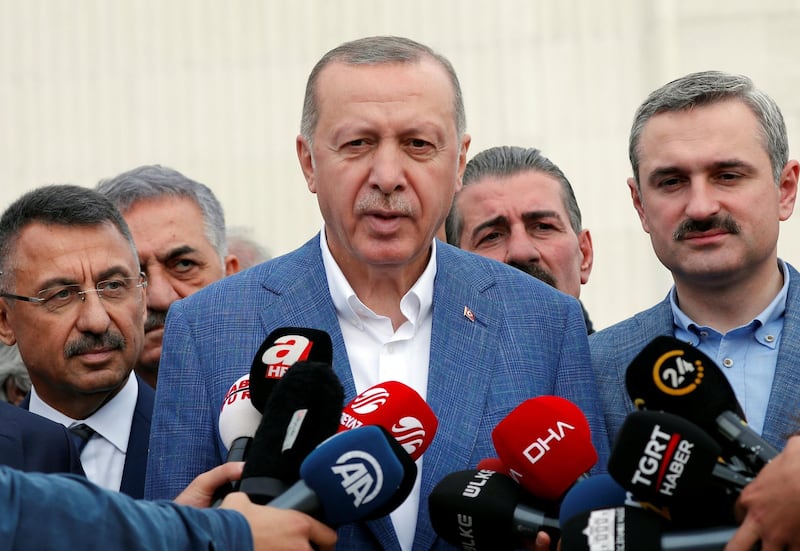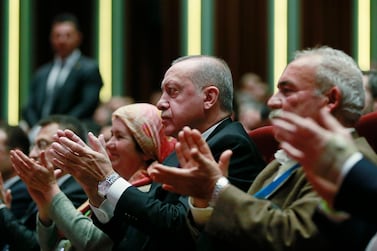Washington and Ankara are on a collision course over Turkey's purchase of Russian missile systems, analysts say, as President Recep Tayyip Erdogan renewed his “determination” to complete the deal in the face of American opposition.
With less than a month left before the first of Russia’s S-400 missile defence system arrives in Turkey, the window for a breakthrough between Washington and Ankara on is narrowing.
Speaking to reporters in Ankara on Tuesday, Mr Erdogan made it clear he will not cancel the deal, despite the US warning of sanctions and axing Turkey's purchase and production of the next generation stealth multirole F35 fighter jet – the largest and most expensive weapons system ever produced – due to the "unacceptable risk" it posed.
"There is an agreement. We have determination. It is out of the question to take a step back from it,” Mr Erdogan said.
One of the proposals floated by the US is to grant Turkey Raytheon’s Patriot missile system as an alternative to Russia’s S-400, but Mr Erdogan said such a bargain remains insufficient. “Unfortunately we haven't received a positive proposal from the American side on the subject of Patriots like the S-400s from Russia,” he said.
One of the main aspects of the Russian deal that the US does not appear to have offered is for Ankara to receive the sensitive missile technology behind the equipment as well as a deal to help develop and produce future iterations of the system.
From the US side, officials have maintained that discussions continue in hopes of delaying the delivery of the S-400 and averting a clash with a NATO ally. A US defence official told The National that "robust discussions continue with our Turkish counterparts…however, we have been clear that purchasing the S-400 would create an unacceptable risk." He warned that "[the S-400] radar system could provide the Russian military sensitive information on the F-35 [aircraft]."
The official was firm that “those concerns cannot be mitigated” and said Turkey’s participation in the F-35 program has been discussed if it acquires the S-400. Turkey has been a member of the Joint Strike Fighter program that it joined in 2002, and has at least 100 F-35 fighters on order from the United States. This membership and those deliveries are at risk if it acquires the S-400.
But experts saw a shrinking room for compromise with initial deliveries for the S-400 planned for July. Nicholas Danforth, a senior visiting fellow at the German Marshall Fund, summed up the standoff as such “barring any clear evidence that Turkey has agreed to delay the S-400 delivery or the US Congress has agreed to delay sanctions, it’s safe to assume we are still on a collision course.”
Mr Danforth told The National that a US-Turkey joint working group announced last week is not enough to avoid a collision. "Proposing a study group while insisting the S-400 purchase is a done deal will not satisfy those in Washington pushing for sanctions," he said.
Ryan Bohl, a Middle East and North Africa analyst at US intelligence firm Stratfor, argued that even if the White House settles for a deal with Turkey, the delivery of the S-400 will immediately trigger a clash with Congress. Mr Trump and Mr Erdogan held a phone call last Thursday.
"There is a major disconnect on the US side which is confusing things," Mr Bohl said. "Congress is adamant that no S-400 should be delivered, but it appears that Mr Trump is trying to make a deal anyway," the expert told The National.
The US President "could opt to refuse or delay the sanctions, while he still tries to negotiate with Mr Erdogan, but we just don't see Mr Erdogan giving up the S-400 for any offer."
“That's a collision course between Congress and Turkey,” Mr Bohl said.
Laws drafted by Congress such as the Countering America’s Adversaries Through Sanctions Act (CAATSA) will immediately slap sanctions on Turkey if the S-400 equipment is delivered. Another Senate bill under consideration would block F-35 deliveries to Turkey and oust it from the production consortium over the purchase of Russian equipment.
The US House of Representatives is considering a similar bill to the Senate, called “Protecting NATO Skies Act of 2019.”
It threatens that “proceeding with the S-400 is unacceptable and will not be tolerated.”
Reuters also reported last week that Washington was seriously considering suspending training for Turkish pilots who are already in the US on the F-35 jets if the S-400 issue is not resolved.






